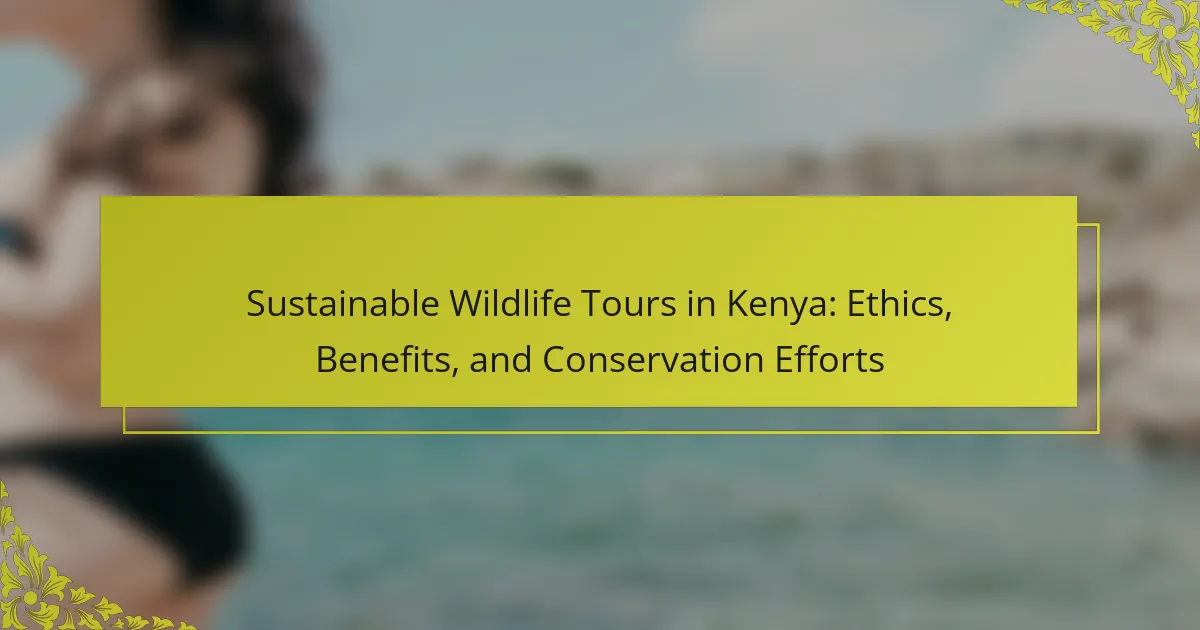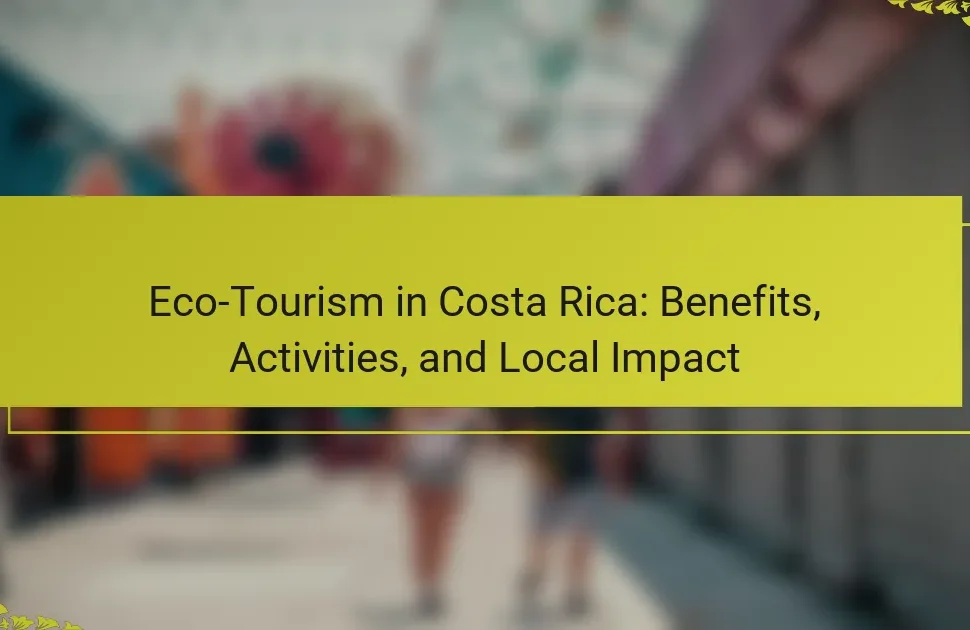Sustainable wildlife tours in Kenya offer ethical experiences that support local communities and conservation efforts. These tours prioritize responsible wildlife viewing, habitat preservation, and eco-friendly practices. They generate income for local economies while educating tourists on biodiversity and ecosystem health. However, challenges remain in balancing tourism growth with effective conservation initiatives.
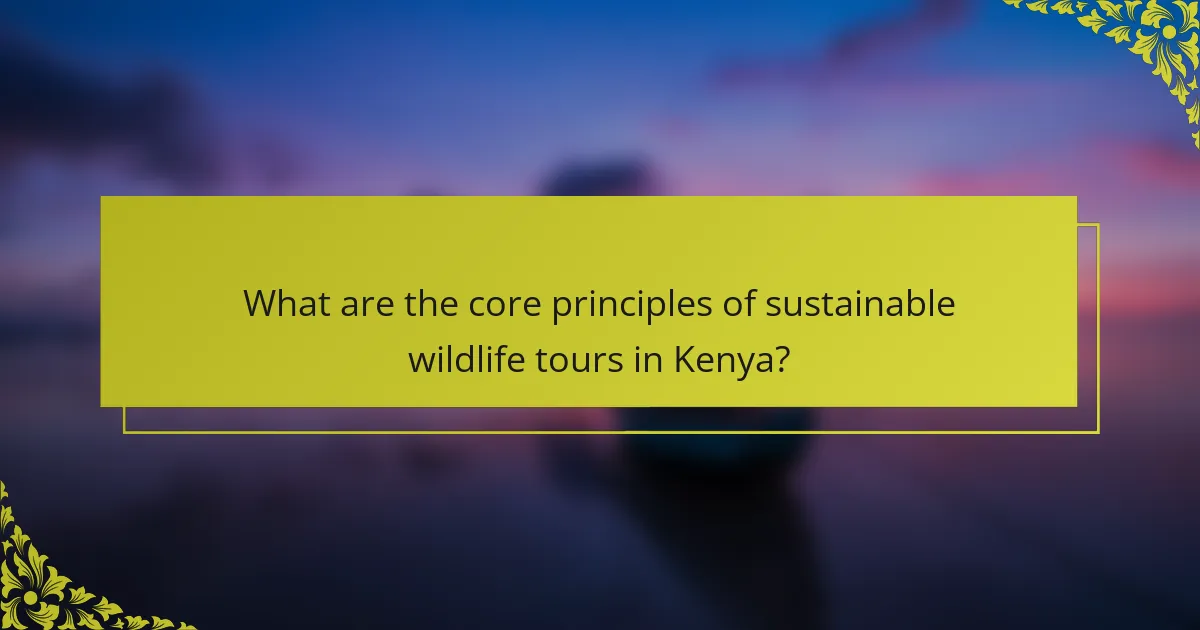
What are the core principles of sustainable wildlife tours in Kenya?
Sustainable wildlife tours in Kenya prioritize ethical practices, community involvement, and conservation efforts. They aim to minimize environmental impact while enhancing the local economy. Key principles include responsible wildlife viewing, supporting local communities, and promoting habitat conservation. These tours often incorporate educational components, fostering awareness about wildlife protection. Additionally, they emphasize minimizing carbon footprints through eco-friendly transport and accommodations.
How do ethical considerations shape wildlife tourism practices?
Ethical considerations significantly influence wildlife tourism practices by prioritizing conservation and local community welfare. Sustainable wildlife tours in Kenya emphasize responsible interactions with wildlife, minimizing environmental impact, and supporting conservation efforts. Tour operators often implement practices that respect animal habitats and promote ethical wildlife encounters. For instance, guidelines ensure that tourists do not disturb animals or their environments, fostering a balance between tourism and conservation. Additionally, ethical wildlife tourism contributes to local economies, enhancing community involvement in conservation initiatives.
What role do local communities play in sustainable wildlife tours?
Local communities play a crucial role in sustainable wildlife tours by promoting conservation and responsible tourism practices. They provide authentic experiences that educate visitors about local ecosystems and wildlife. By involving local people, wildlife tours can ensure that economic benefits support community development and conservation efforts. This collaboration fosters a sense of stewardship, encouraging locals to protect their natural resources. Additionally, local knowledge enhances wildlife viewing experiences, making tours more enriching for visitors.
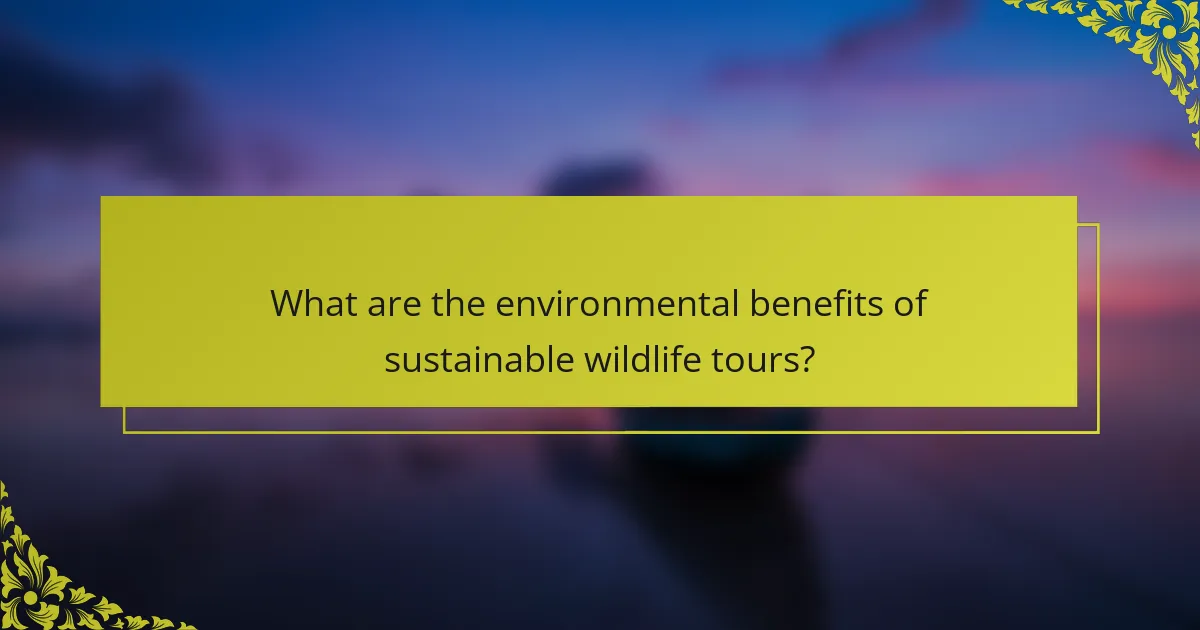
What are the environmental benefits of sustainable wildlife tours?
Sustainable wildlife tours in Kenya provide significant environmental benefits, including habitat preservation and biodiversity protection. These tours promote conservation efforts by educating tourists and generating funds for local communities. They help reduce poaching and encourage the sustainable management of natural resources. Additionally, they foster a deeper appreciation for wildlife, leading to more robust conservation initiatives. By prioritizing eco-friendly practices, sustainable wildlife tours contribute to the overall health of ecosystems.
How do sustainable tours contribute to biodiversity conservation?
Sustainable wildlife tours in Kenya significantly enhance biodiversity conservation by promoting responsible tourism practices. These tours generate funds for local conservation efforts, providing financial support for wildlife protection initiatives. Additionally, they raise awareness about the importance of biodiversity among tourists and locals alike.
Through eco-friendly practices, sustainable tours minimize habitat disturbance and promote the preservation of ecosystems. They often involve community engagement, empowering local populations to participate in conservation strategies. This collaboration fosters a deeper connection between communities and their natural environment, enhancing long-term conservation outcomes.
In summary, sustainable wildlife tours contribute to biodiversity conservation by generating funds, raising awareness, minimizing environmental impact, and fostering community involvement.
What impact do these tours have on wildlife habitats?
Sustainable wildlife tours positively impact wildlife habitats by promoting conservation and responsible tourism. These tours often fund local conservation projects, helping to preserve ecosystems. They raise awareness among tourists about the importance of protecting wildlife. Additionally, they encourage local communities to engage in conservation efforts, fostering a sense of stewardship over natural resources. As a result, sustainable wildlife tours contribute to habitat restoration and the protection of endangered species, enhancing biodiversity in Kenya.
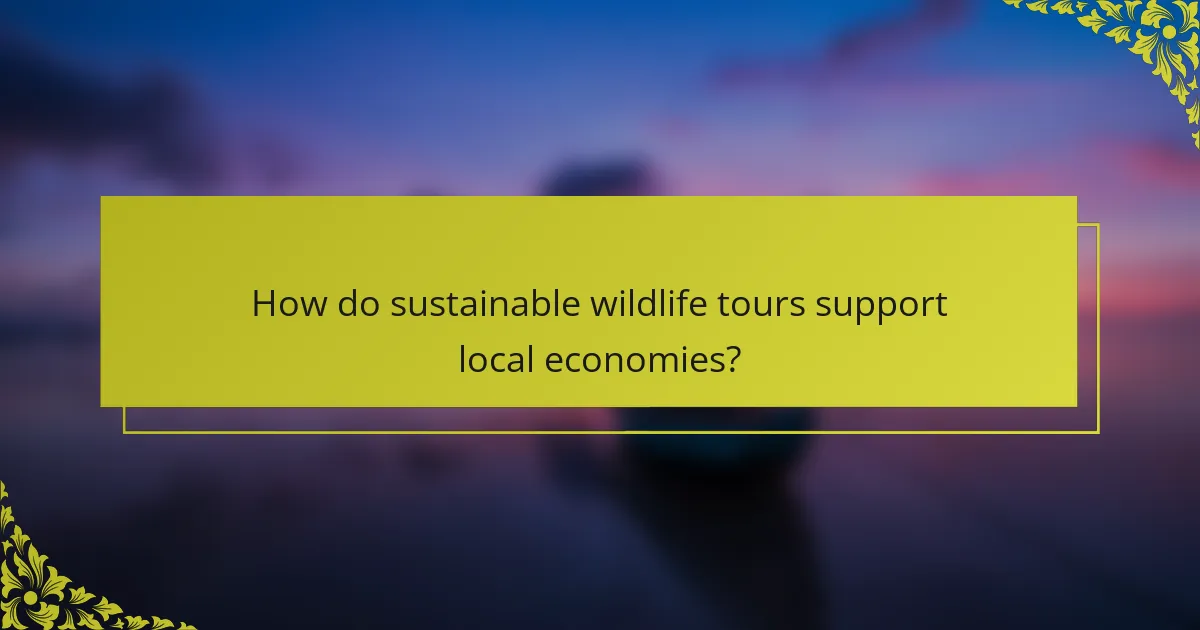
How do sustainable wildlife tours support local economies?
Sustainable wildlife tours in Kenya significantly bolster local economies by generating income and employment opportunities. These tours promote conservation, attracting tourists who contribute to community projects. Local guides and artisans benefit directly from increased visitor numbers, enhancing their livelihoods. Additionally, a portion of tour fees often supports wildlife protection initiatives, ensuring long-term ecological balance and community engagement.
What are the economic benefits for local communities?
Sustainable wildlife tours in Kenya provide significant economic benefits for local communities. These tours create jobs, promote local businesses, and generate income through eco-tourism.
For example, local guides earn wages while showcasing wildlife, and artisans sell crafts to tourists. Additionally, revenue from entrance fees supports community projects and conservation efforts. As a result, sustainable tourism fosters economic development while preserving natural resources.
How do sustainable tours promote responsible tourism?
Sustainable tours promote responsible tourism by prioritizing ethical practices and environmental conservation. These tours support local communities, minimize ecological footprints, and raise awareness about wildlife preservation. By engaging in sustainable wildlife tours in Kenya, travelers contribute to conservation efforts and help protect endangered species. Additionally, these tours often employ local guides, ensuring that the economic benefits directly support the communities involved.
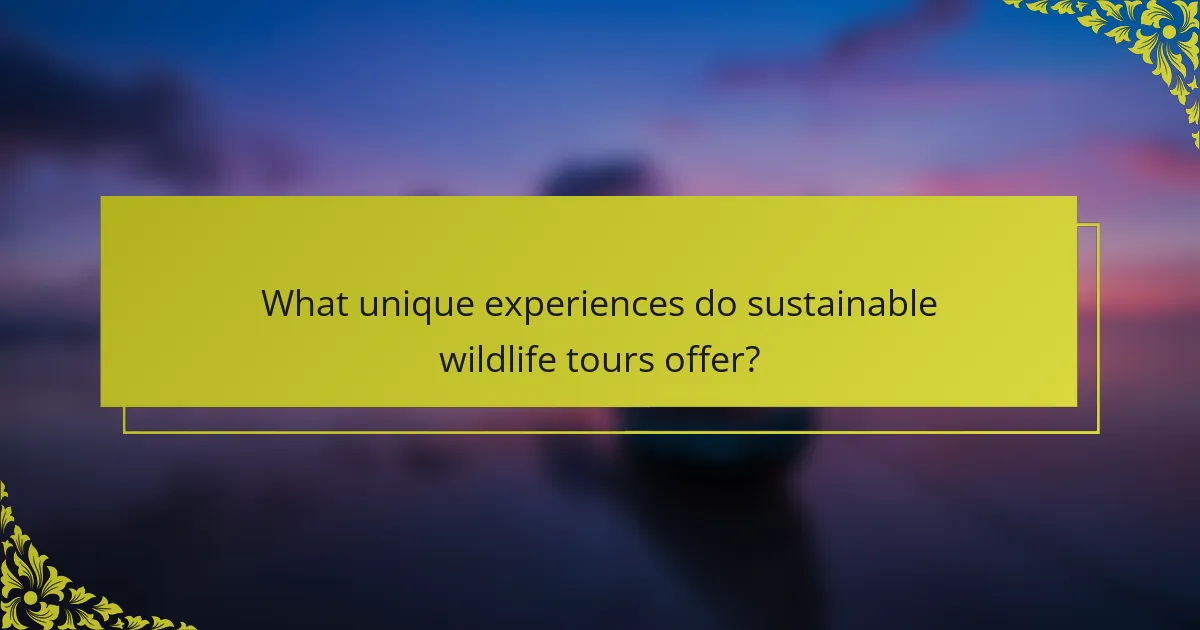
What unique experiences do sustainable wildlife tours offer?
Sustainable wildlife tours in Kenya offer immersive experiences that prioritize ethical interactions with wildlife. Tourists engage in conservation efforts, supporting local communities while observing animals in their natural habitats. These tours often include guided walks, educational programs, and eco-friendly accommodations, enhancing the overall experience. Participants gain insights into biodiversity, ecosystem preservation, and the importance of sustainable practices.
How do cultural interactions enhance the wildlife tour experience?
Cultural interactions significantly enhance the wildlife tour experience by fostering deeper connections with local ecosystems. Engaging with local communities allows tourists to understand conservation efforts and the importance of biodiversity. This interaction promotes ethical tourism practices, encouraging respect for wildlife and habitats. Additionally, cultural exchanges provide unique insights into traditional conservation methods, enriching the overall experience and supporting sustainable practices.
What are the unique wildlife viewing opportunities available?
Sustainable wildlife tours in Kenya offer unique opportunities to observe diverse species in their natural habitats. These tours prioritize ethical practices and conservation, enhancing the wildlife viewing experience.
Visitors can witness the Great Migration, where millions of wildebeest and zebras traverse the Maasai Mara. Birdwatching is exceptional, with over 1,000 species recorded, including rare endemics.
Guided tours often include community interactions, allowing travelers to learn about local conservation efforts. Night safaris provide rare chances to see nocturnal wildlife, enriching the overall experience.
Engaging in these tours supports conservation initiatives, ensuring the protection of Kenya’s rich biodiversity for future generations.
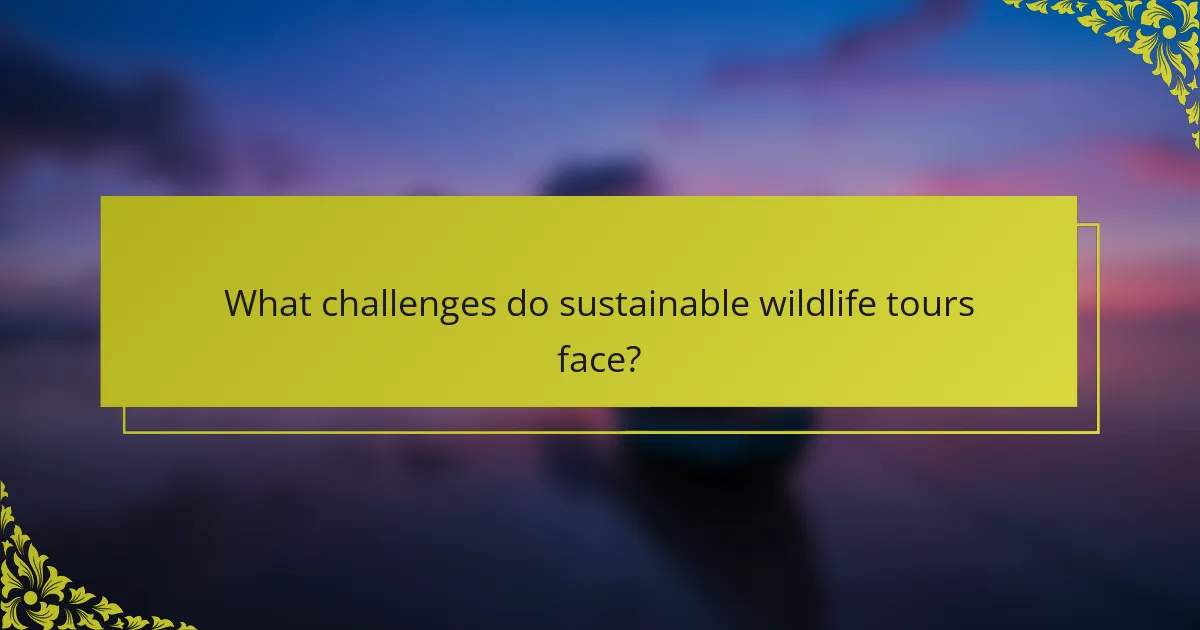
What challenges do sustainable wildlife tours face?
Sustainable wildlife tours in Kenya face challenges such as environmental impact, community involvement, and funding. Tour operators often struggle with balancing tourism growth and conservation efforts. Limited resources can hinder effective wildlife protection and habitat preservation. Additionally, ensuring local communities benefit from tourism remains a critical issue.
How do climate change and environmental degradation impact wildlife tourism?
Climate change and environmental degradation negatively affect wildlife tourism by reducing biodiversity and altering habitats. These changes lead to fewer wildlife sightings and diminished visitor experiences. For example, extreme weather events disrupt migration patterns, making it harder for tourists to observe animals in their natural environments. Additionally, habitat loss from deforestation and pollution threatens species survival, which directly impacts the sustainability of wildlife tourism in Kenya. Conservation efforts are crucial to mitigate these effects and ensure the longevity of wildlife tourism.
What are the common misconceptions about sustainable wildlife tours?
Many misconceptions exist about sustainable wildlife tours in Kenya. One common belief is that these tours are expensive and only for wealthy tourists. In reality, various options cater to different budgets while promoting ethical practices. Another misconception is that sustainable tours do not offer authentic wildlife experiences. However, these tours often prioritize conservation, providing unique encounters that benefit both wildlife and local communities. Some people think sustainable wildlife tours do not support local economies. In fact, many such tours directly contribute to community development and conservation efforts. Lastly, a belief persists that all wildlife tours are harmful to animals. Sustainable tours, in contrast, emphasize responsible interactions and minimize ecological footprints.
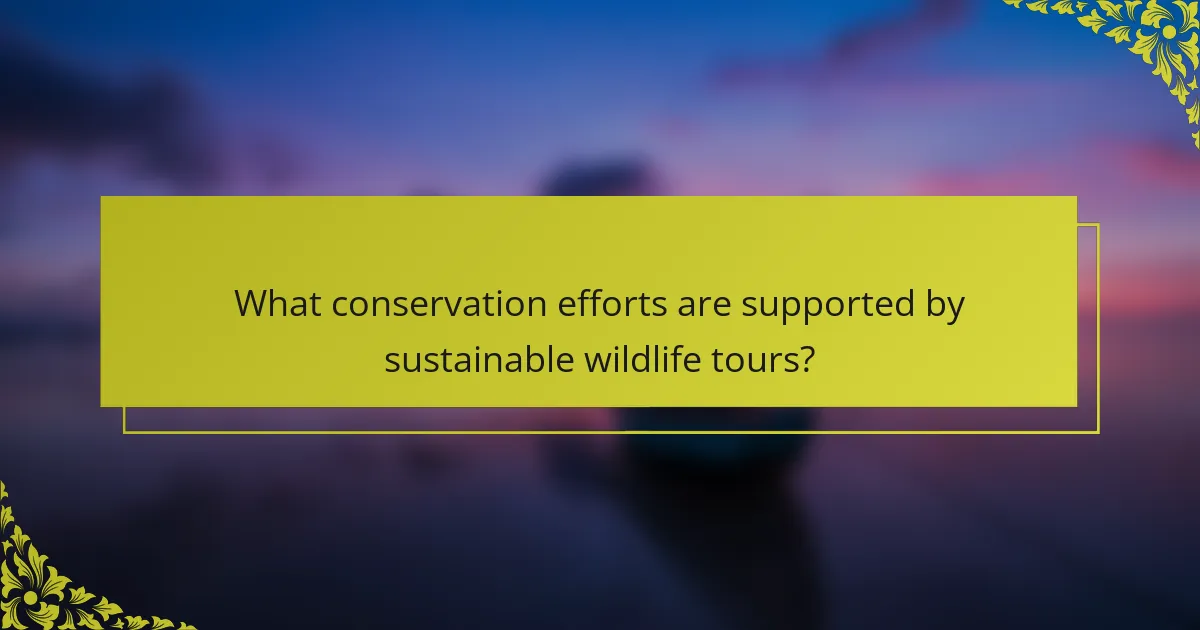
What conservation efforts are supported by sustainable wildlife tours?
Sustainable wildlife tours support various conservation efforts, including habitat preservation, anti-poaching initiatives, and community education. These tours generate funding for wildlife reserves, promote biodiversity, and empower local communities to protect their natural resources. For example, revenues from these tours often contribute to the establishment and maintenance of protected areas, ensuring safe habitats for endangered species. Additionally, sustainable practices foster awareness about wildlife conservation, encouraging responsible tourism behaviors among visitors.
How do partnerships with conservation organizations enhance tour effectiveness?
Partnerships with conservation organizations significantly enhance tour effectiveness by ensuring authentic wildlife experiences and promoting ethical practices. Collaborating with these organizations provides access to expert knowledge on local ecosystems, fostering responsible tourism. This partnership supports conservation efforts, helping to protect habitats and wildlife. Additionally, it can improve visitor engagement through educational programs that raise awareness about environmental issues. As a result, tourists are more likely to support sustainable practices, contributing to long-term conservation goals.
What initiatives are in place to protect endangered species through tourism?
Sustainable wildlife tours in Kenya promote conservation by funding protection initiatives for endangered species. These tours often support local communities and wildlife reserves, enhancing awareness and financial resources for conservation efforts. Tour operators educate visitors about the ecological importance of species, fostering a sense of responsibility. As a result, tourists contribute directly to habitat preservation and anti-poaching measures, benefiting both wildlife and local economies.
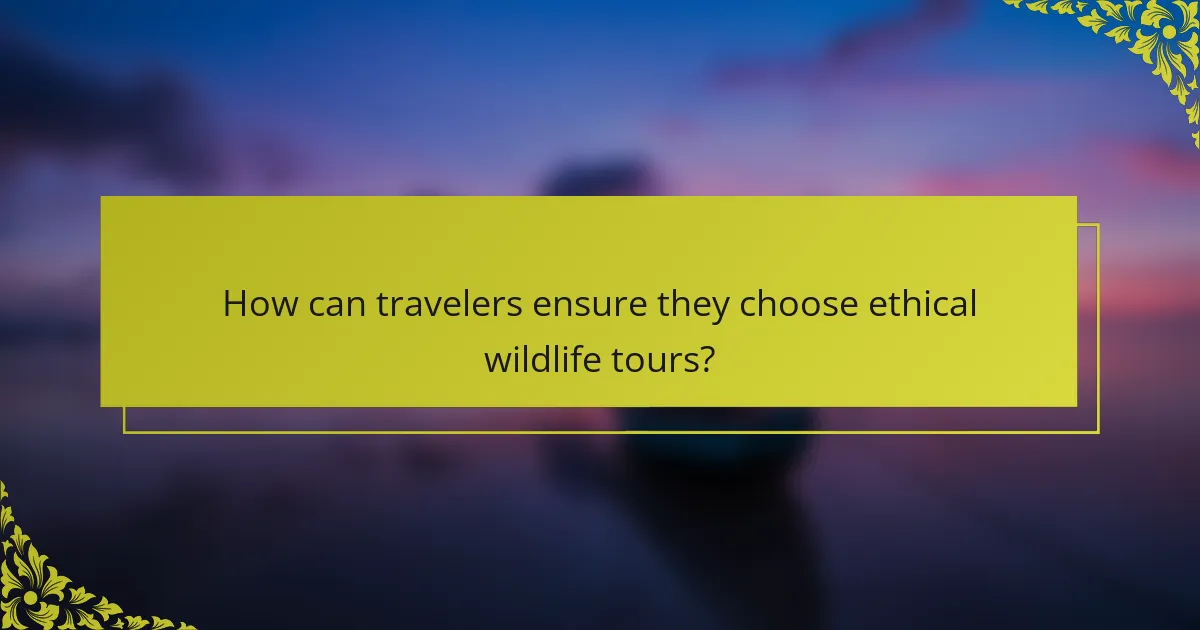
How can travelers ensure they choose ethical wildlife tours?
Travelers can ensure they choose ethical wildlife tours by researching tour operators, prioritizing those that support local communities and conservation. Look for certifications from recognized organizations, as these indicate adherence to ethical standards. Additionally, seek tours that emphasize animal welfare and minimize human impact on habitats. Engaging with local guides who respect wildlife is also crucial.
What questions should travelers ask before booking a tour?
Travelers should ask about the tour operator’s ethical practices, conservation contributions, and animal welfare standards. Understanding these aspects ensures a responsible and impactful experience. Additionally, inquire about the tour’s carbon footprint, community involvement, and support for local wildlife initiatives. These questions help gauge the sustainability of the wildlife tour.
What certifications indicate a tour’s commitment to sustainability?
Certifications indicating a tour’s commitment to sustainability include the Ecotourism Certification, Green Globe Certification, and Rainforest Alliance Certification. These certifications ensure adherence to environmental standards, community engagement, and conservation practices. For instance, the Ecotourism Certification emphasizes responsible travel to natural areas, benefiting local communities and preserving ecosystems.
What common mistakes should travelers avoid when selecting wildlife tours?
Travelers should avoid selecting wildlife tours that prioritize profit over conservation. Common mistakes include overlooking tour operators’ ethical practices, neglecting to research the impact on local ecosystems, and failing to consider community involvement. Choosing tours that support wildlife conservation and local communities enhances the experience and promotes sustainability. Always verify operators’ credentials and seek reviews from previous travelers to ensure responsible choices.
